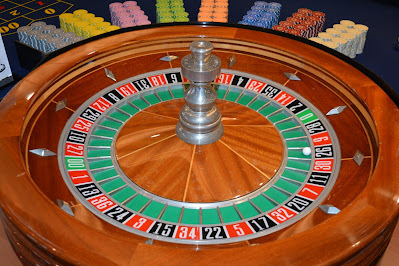 This is the first of a couple of posts on the mathematical approach known as the Monte Carlo method.
This is the first of a couple of posts on the mathematical approach known as the Monte Carlo method.I want to start gently by taking a (virtual) trip to Monte Carlo in Monaco and its famous casino, specifically to explore a once well known phrase - the man who broke the bank at Monte Carlo. The article below is extracted from my book Dice World.
A roulette wheel is a physical device, and as such is not a perfect mechanism for producing a random number between 1 and 37 (or 38 in the more money-grabbing US casinos). Although wheels are routinely tested, it is entirely possible for one to have a slight bias – and just occasionally this can result in a chance for players to make a bundle. It certainly did so for 19th-century British engineer Joseph Jagger, who has, probably incorrectly, been associated with the song ‘The Man Who Broke the Bank at Monte Carlo’, which came out around the same time as Jagger had a remarkable win in Monaco. The song probably referred instead to the conman Charles Wells, who won over a million francs at Monte Carlo and did indeed ‘break the bank’. (This doesn’t mean that he cleaned out the casino, simply that he used up all the chips available on a particular table.) There were many attempts to find how Wells was cheating, but he later admitted that it was purely a run of luck, combined with a large amount of cash enabling him to take the often effective but dangerous strategy of doubling the stake on every play until he won.
However, Jagger probably deserves the accolade more than Wells, as his win was down to the application of wits rather than luck – and was even more dramatic. Jagger finally amassed over 2 million francs – the equivalent of over £3 million (or $5 million) today. He hired a number of men to frequent the casino and record the winning numbers on the six wheels. After studying the results he discovered that one wheel favoured nine of the numbers significantly over the rest. By sticking to these numbers he managed to beat the system until the casino realised it was just this wheel that was suffering large losses and rearranged the wheels overnight. Although Jagger soon tracked down the wheel, which had a distinctive scratch, the casino struck back by rearranging the numbers on the wheel each night, making his knowledge worthless.
Incidentally, I have always found it bizarre that casinos consider it to be cheating if players use skill to win. Unless there is a fault with the wheel, there is no skill in roulette, but there certainly can be in games like blackjack, where there are a limited number of cards available to play, and so by counting the cards that have already been dealt, a player with a superb memory (or a concealed computer) can increase their chances of winning. Apparently you get thrown out of casinos if you are caught doing this and barred from re-entering. Imagine if athletes were banned from their sport if they showed any sign of skill. It just demonstrates what should be obvious: casinos aren’t a way of playing fair games, they are businesses designed to take money off people.
Image from Unsplash by Derek Lynn
See all of Brian's online articles or subscribe to a weekly digest for free here
You can buy
Dice World from
Amazon.co.uk Amazon.com and
Bookshop.org
Using these links earns us commission at no cost to you
Published on April 03, 2024 02:03
 newest »
newest »
 newest »
newest »
 Jim wrote: "In any case, keep up the good work - your books and blogs are fine examples of their kind." Thanks, Jim. I'd refer you to the book for more on Dice World.
Jim wrote: "In any case, keep up the good work - your books and blogs are fine examples of their kind." Thanks, Jim. I'd refer you to the book for more on Dice World.




(looking forward to your next post)
The anecdotes about beating a wheel are interesting.
I also look forward to your discussion of Dice World and the "tease" that the world is not so deterministic as Newton (and others) thought.
Do you know of Sabine Hossenfelder? She does videos on topics-of-interest - mostly scientific, which are not boringly trivial.
One recent topic is "clickbaited" - something like why she does NOT believe in free will - I haven't as yet taken that bait.
I have always found it bizarre that casinos consider it to be cheating if players use skill to win.
Apparently you get thrown out of casinos if you are caught doing this (counting cards at blackjack) and barred from re-entering. Imagine if athletes were banned from their sport if they showed any sign of skill.
I risk stating the obvious to say that a casino is like any other merchant (selling goods in the one case, selling entertainment in the other.) A merchant is not obligated to tolerate your behavior - nor is a casino. Both exercise their prerogatives on their private property.
The professional athlete analogy seems to be an error in that the athlete sells his skill and the casino sells entertainment.
In any case, keep up the good work - your books and blogs are fine examples of their kind.